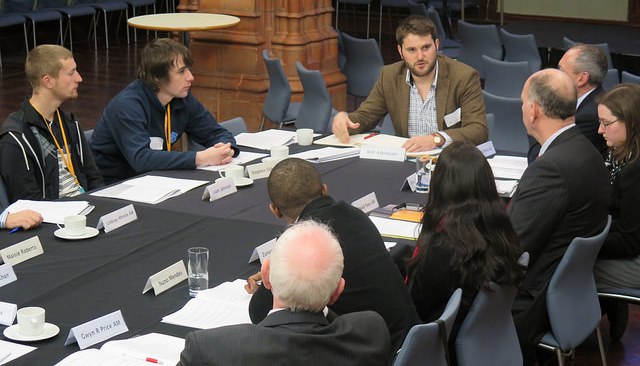The representation of women in elected positions in Wales is not mirrored by the number of women giving evidence
Wales has made more progress on gender equality in its elected bodies than Westminster or the other devolved governments. However, Rebecca Rumbul’s research indicates that the number of non-elected women giving evidence to committees in the Welsh National Assembly is much lower, and in one third of the cases all the participants were male. She writes that this points to a level of normalisation of gender imbalance in the provision of oral evidence, and potentially reduces the quality and breadth of scrutiny.
Gender equality in UK politics has moved higher and higher up the agenda in recent years, and positive steps have been taken by all of the major parties in recruiting more female candidates for elected office. Whilst parity still has not been achieved in Westminster, larger percentages of the devolved governments of the UK are now made up of female representatives, and visible female representatives play a significant role in encouraging more women to view the political sphere as somewhere they belong. However, scant attention has been paid to the gender balance of politically active individuals in non-elected positions. Elected representatives lean heavily upon the expertise and input of a wide range of stakeholders in the formulation and consideration of legislation and policy. The practice of inviting such experts to provide oral evidence to committees is a key feature in the process of scrutiny, and in ensuring legislation or policy is balanced and appropriate for all members of society. So there should be a reasonable expectation that those individuals providing oral evidence to parliamentary committees that are developing and scrutinising legislation are broadly representative of the resident population, providing for a level of ‘descriptive representation’ even in the absence of meaningful ‘substantive representation’.
In a recent study Gender Inequality in Democratic Participation: Examining Oral Evidence to the National Assembly for Wales I looked at the gender breakdown of individuals providing oral evidence to committees in the Welsh National Assembly. As the only government in the UK to have achieved gender parity in its elected body (in 2005), and with a history of implementing policies considered to be more accommodating to women, the National Assembly for Wales was hypothesised to be the most likely government to demonstrate a similar level of gender parity in its pool of expertise as in its elected chamber.
This was found not to be the case.
The findings are based on analysis of the minutes of 1,036 committee meetings conducted during the first three Assemblies, covering the periods 1999–2003, 2003–2007 and 2007–2011. The committees examined covered a broad spectrum of governmental concerns to reduce bias in what could be argued to be typically gendered subject areas, and included agriculture and rural development, culture, economic development, education, environment, health and social services, local government and European affairs.
Analysis of the overall data for female and male external non-elected participants from civil society, the public sector and the private sector demonstrate that women made up only 27 percent of representatives across a twelve-year period, composed of 904 appearances by women out of a total of 3,274 instances of external individuals participating in committee meetings. This was lower than in elected roles within the NAfW, which was at one point during the second Assembly over 50 per cent. As of the 2011 election it stands at 25 women out of a total of 60, representing 42 per cent female representation.
Men always outnumbered female participants, but the exact proportion of women participating fluctuated depending on sector. Women originating from the private sector represented only 6.5 per cent of all individuals providing evidence to committees in the period 1999–2011. Female participants in committees from the public sector were double that of the private sector, but at 26 per cent nevertheless stood at only a hair above one-quarter of participants. This is in stark contrast to the number of women employed in the public sector in Wales, where women comprise approximately two-thirds of the workforce.
The proportion of women participating in giving evidence varied significantly between different committees concerned with differing policy areas. While no individual committee analysed in this study achieved equal representation, some committees covering areas that could be argued to be more predominantly ‘female’ concerns, such as health and education, were closest to achieving parity with 42 per cent of participants being female. Committees covering areas that historically could be considered to be more ‘male’ concerns, such as agriculture and economic development, demonstrated the largest gap in gender representation, with female participants comprising only 19 per cent of those giving evidence.
Most worryingly, in analysing the data, it became apparent that there was a high frequency of occurrences where no female representatives at all were called upon to provide evidence to committees. Out of 1,036 meetings analysed for this study, 338 (33%) drew evidence from men only, with no women present to give evidence in those meetings. In contrast, were only 43 occurrences in which men were not present to give evidence, which is only 4% of the total. This points to a level of normalisation of gender imbalance in the provision of oral evidence, and potentially reduces the quality and breadth of scrutiny.
While policy expertise is limited and, in many cases, provided by a male participant because they are the senior individual within their respective organisation, this study raises important questions about the male bias in the legislative scrutiny process, and is another demonstration of the male bias in senior positions in wider society. With legislation and policy remaining a male-dominated sphere, women will continue to be subject to political and societal structures that fail to fully accommodate or account for their interests.
—
Click here to access the full article Gender Inequality in Democratic Participation: Examining Oral Evidence to the National Assembly for Wales. Note: this post represents the views of the author, and not those of Democratic Audit or the LSE. Please read our comments policy before posting.
—
 Rebecca Rumbul is Head of Research at mySociety. She was formerly the Manager of the Wales Governance Centre at Cardiff University
Rebecca Rumbul is Head of Research at mySociety. She was formerly the Manager of the Wales Governance Centre at Cardiff University






 Democratic Audit's core funding is provided by the Joseph Rowntree Charitable Trust. Additional funding is provided by the London School of Economics.
Democratic Audit's core funding is provided by the Joseph Rowntree Charitable Trust. Additional funding is provided by the London School of Economics.
https://t.co/PuHxIKrtJt
The representation of women in elected positions in Wales is not mirrored by the number of women giving evidence https://t.co/Qq46qveHWO
The representation of women in elected positions in Wales is not mirrored by the number of women giving evidence https://t.co/frFr9BkRDN
2 good @democraticaudit posts on #gender today- yes progress but push for more. Wales: https://t.co/rPFTAoHpNu Scot: https://t.co/FnUXQFCBjJ
These two pieces on women’s representation in committee sessions and at conferences: https://t.co/aGglXIK3kl https://t.co/0JYu1sHvCY
The representation of women in elected positions in Wales is not mirrored by the number of women giving evidence https://t.co/BMYUgR572A
Women’s roles in elected positions in Wales are not mirrored by the number of women giving evidence to the Assembly https://t.co/WpIeGdH3br
The representation of women in elected positions in Wales is not mirrored by the number of… https://t.co/meAyYM5d8g https://t.co/5UcvdsZmwy